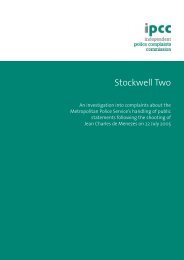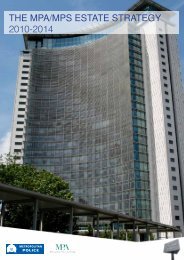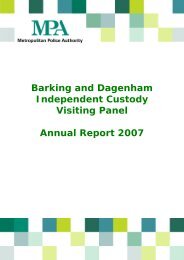MPA & MPS Budget book 2006-07
MPA & MPS Budget book 2006-07
MPA & MPS Budget book 2006-07
Create successful ePaper yourself
Turn your PDF publications into a flip-book with our unique Google optimized e-Paper software.
<strong>MPA</strong> Revenue and Capital <strong>Budget</strong> Book <strong>2006</strong>/<strong>07</strong><br />
INTRODUCTION<br />
This section sets out the capital programme for the Metropolitan Police Authority for <strong>2006</strong>/<strong>07</strong> to<br />
2008/09. The capital programme is now based on a three-year plan rather than a five-year span of<br />
previous budget <strong>book</strong>s. This aligns with the budget submission as required by the Greater London<br />
Authority (GLA) and the revised capital grant settlement arrangements announced by the Home<br />
Office.<br />
The capital programme is prepared in accordance with the <strong>MPA</strong>’s Capital Strategy. This has as its<br />
key thrust the premise that capital investment should support core policing services and the<br />
achievement of key objectives. The Capital Strategy provides a clear picture of the Authority’s<br />
process for managing its tangible assets by reference to corporate priorities. The latest priorities are<br />
set out in the recently published Corporate Strategy <strong>2006</strong>-2009. The Capital Strategy focuses on<br />
processes to take forward a strategic led, priority driven, capital programme. Its effectiveness is<br />
reviewed annually in the light of changing needs and priorities. This ongoing re-evaluation of the<br />
strategy ensures that it remains effective and reflects developments in the Authority’s objectives and<br />
best asset management.<br />
Therefore, the capital programme is based on the focus given to the future direction of the Service by<br />
st<br />
the Corporate Strategy and the demands imposed by policing London in the 21 Century. It is<br />
regularly reviewed and projects are prioritised on the basis of:<br />
• Their alignment with the requirements of the Met Modernisation Programme.<br />
• Meeting one or more of the strategic priorities within the Corporate Strategy.<br />
• A mandatory legal requirement to provide a service or asset.<br />
• The continuation or completion of a project where significant expenditure has already occurred<br />
and unjustifiable wastage of resources would result.<br />
• Continuing or completing a capital project where there is a contractual commitment.<br />
• Where significant revenue savings would result.<br />
• A demonstrable need to replace an asset for efficiency purposes as noted within the relevant<br />
asset management plan.<br />
Before the allocation of funding to individual projects can be proposed, consideration must be given to<br />
the:<br />
• Determination of the funding sources available to meet capital expenditure.<br />
• Allocation of the programme across business groups and relevant financial years.<br />
• Capacity of the business groups to manage and deliver named capital projects within timescale<br />
and cost.<br />
• Assurance that sufficient capital cash reserves are maintained should critical capital expenditure<br />
issues arise.<br />
All projects within the programme are shown according to the year in which capital expenditure is<br />
planned to occur. Schemes are listed in accordance with the relevant service provider that manages<br />
and supports delivery for the user. Individual project expenditure is not shown as this could<br />
compromise future contract negotiation. However, overall budgeted expenditure totals for each<br />
service provider for each financial year are noted. A table summarising the scale of the three-year<br />
capital programme, and how planned expenditure is intended to be funded, is shown prior to the<br />
detailed service provider breakdown.<br />
Resources are inevitably limited and it is essential that timely and prudent use be made of available<br />
funds. Strict monitoring of the programme is undertaken and regular monitoring reports are submitted<br />
to the <strong>MPA</strong> Finance Committee to confirm that projects are being delivered to timetable. In<br />
circumstances where ‘slippage’ or savings have occurred, recommendations are made to ensure that<br />
judicious use of funds occurs. In respect of programme slippage, the opportunity for project escalation<br />
is investigated in order to maintain expenditure at the budgeted level. This will eliminate, wherever<br />
possible, project management difficulties due to capacity issues.<br />
The land and buildings capital programme has been structured on meeting the demands and<br />
pressures placed upon a modern and rapidly expanding police service. The Estate Renewal<br />
Programme has been developed to ensure we have suitable operational properties to provide the<br />
71


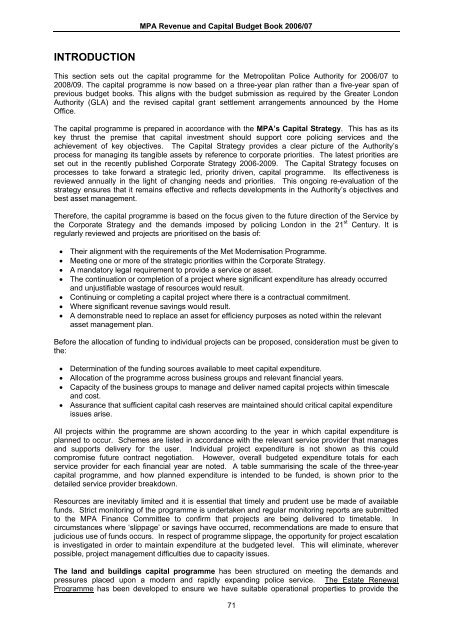
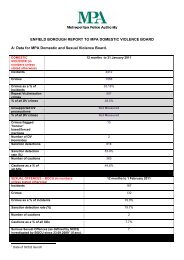
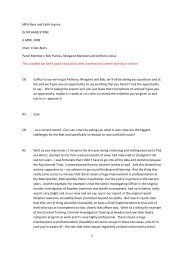
![Appendix 1 [PDF]](https://img.yumpu.com/51078997/1/184x260/appendix-1-pdf.jpg?quality=85)

![Transcript of this meeting [PDF]](https://img.yumpu.com/50087310/1/184x260/transcript-of-this-meeting-pdf.jpg?quality=85)
![Street drinking in Hounslow [PDF]](https://img.yumpu.com/49411456/1/184x260/street-drinking-in-hounslow-pdf.jpg?quality=85)





